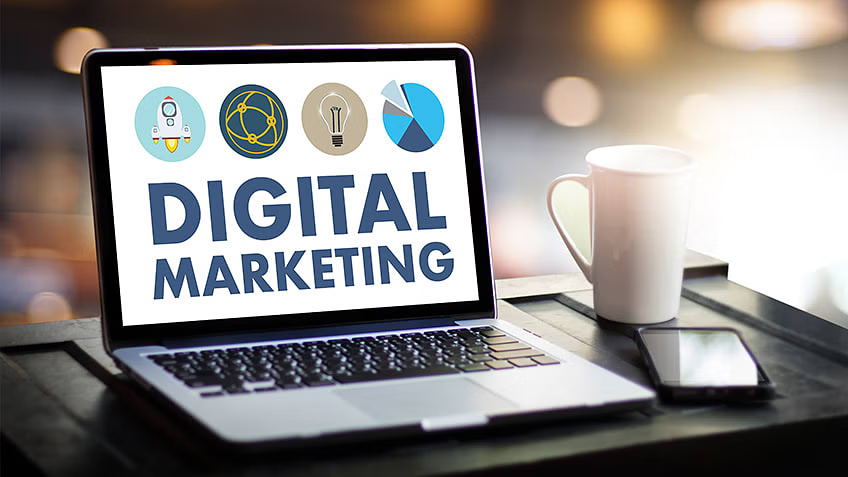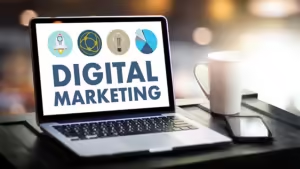
In today’s fast-paced business world, digital marketing has become a game-changer. It’s revolutionizing how companies in India reach their audiences. This guide explores the strategies and trends that are defining marketing in the digital age.
Key Takeaways
- Discover the evolution of marketing in the digital era and how it is transforming the business landscape in India.
- Explore the key digital marketing strategies, including content marketing, search engine optimization, and social media marketing.
- Understand the power of email marketing, pay-per-click advertising, and influencer marketing in reaching and engaging your target audience.
- Learn how to leverage digital marketing analytics to make data-driven decisions and drive business growth.
- Gain insights into the future of digital marketing and how to stay ahead of the curve.
What is Digital Marketing?
In today’s digital age, marketing has undergone a profound transformation. Digital marketing has emerged as a powerful and strategic approach. It leverages the vast potential of the online world to connect businesses with their target audience. This dynamic and evolving field encompasses a diverse range of tactics and techniques. These enable organizations to effectively reach, engage, and convert potential customers.
Defining the Concept
At its core, digital marketing refers to the utilization of digital technologies and channels to promote products, services, and brands. It includes a wide array of digital platforms, such as search engines, social media, email, websites, mobile apps, and various other online mediums. By employing these digital tools and strategies, businesses can seamlessly integrate their marketing efforts. They create a cohesive, data-driven approach to reach and influence their target market.
The Evolution of Marketing in the Digital Age
The rise of the internet and the ubiquity of digital devices have profoundly transformed the marketing landscape. Traditional marketing methods, such as print, television, and radio, have gradually given way to more personalized, interactive, and measurable digital strategies. Consumers today are increasingly tech-savvy and spend a significant portion of their time engaging with digital content and platforms. This shift has prompted businesses to adapt their marketing approaches, leveraging the power of digital marketing to effectively reach, connect with, and respond to their target audiences.
| Traditional Marketing | Digital Marketing |
|---|---|
| Mass-based approach | Personalized and targeted |
| Limited data and analytics | Data-driven and measurable |
| One-way communication | Interactive and engaging |
| Passive audience | Active and empowered consumers |
The evolution of marketing in the digital age has empowered businesses to connect with their customers in more meaningful and effective ways. This ultimately drives increased brand awareness, customer engagement, and revenue growth.
“Digital marketing is no longer an option, but a necessity in today’s business landscape. It is the key to unlocking the full potential of your brand and reaching your target audience where they are – online.”
Digital Marketing Strategies
In the fast-paced digital marketing world, Indian businesses are adopting a wide range of strategies. They aim to engage their audience and increase their online presence. Content marketing and search engine optimization (SEO) are at the forefront of this digital transformation.
Content Marketing: Captivating Your Audience
Content marketing has become a vital tool for digital marketers in India. It involves creating engaging and valuable content to connect with the target audience. This approach helps establish a brand’s authority and builds lasting relationships. Whether through informative blog posts or eye-catching social media content, strategic content creation enhances a brand’s digital presence.
Search Engine Optimization: Boosting Online Visibility
SEO complements content marketing, driving organic traffic to a business’s online platforms. By optimizing websites and content, businesses can climb the search engine rankings. This makes it simpler for potential customers to find and interact with their offerings. Effective SEO strategies open up new opportunities for growth and revenue.
As digital marketing strategies continue to evolve, Indian businesses that master content marketing and SEO will stand out. They will capture their audience’s attention and succeed in the ever-changing online world.
Social Media Marketing: Connecting with Your Audience
In today’s digital marketing world, social media has become a crucial tool for businesses to reach their audience. It allows companies to increase their brand’s visibility, build meaningful relationships, and achieve measurable results. Social platforms offer a vast reach and engagement, making them powerful for businesses.
Social media marketing involves a range of strategies, each suited to different social networks. Businesses can create engaging content on Facebook and Instagram or tap into industry leaders on LinkedIn. This approach helps them achieve their marketing goals through social media marketing.
Building Brand Awareness and Engagement
The main aim of digital marketing on social media is to boost brand awareness and engagement. By sharing visually appealing, informative, and entertaining content, businesses can capture their followers’ interest. This encourages followers to interact, share, and become brand advocates.
Targeted Audience Engagement
Social media platforms provide detailed targeting options, enabling businesses to find their ideal customers precisely. Marketers can use demographic, interest, and behavior-based targeting to create campaigns that resonate with their audience. This approach leads to higher engagement and conversion rates.
| Platform | Key Benefits | Targeting Capabilities |
|---|---|---|
| Vast user base, advanced ad targeting | Demographics, interests, behaviors, custom audiences | |
| Visual content engagement, influence marketing | Demographics, interests, behaviors, location | |
| Professional networking, thought leadership | Job titles, industries, company size, education |
By using the unique features of various social media platforms, businesses can effectively connect with their audience. This builds brand loyalty and drives tangible results for their digital marketing efforts.
Email Marketing: Building Lasting Relationships
Email is a key tool in digital marketing, helping businesses nurture leads, build customer loyalty, and boost conversions. By creating impactful email campaigns and using smart email list building, companies can build lasting connections with their audience.
Crafting Effective Email Campaigns
Creating successful email marketing campaigns is about finding the right mix of engaging content, personalization, and timing. To grab your audience’s attention, make your email newsletters valuable, informative, and visually appealing. Tailor each message with the recipient’s name, browsing history, or past interactions with your brand.
Email List Building Techniques
Building a strong, active email list is essential for email marketing success. Use tactics like offering lead magnets, hosting contests, and promoting sign-ups on social media. Keep your subscribers interested by delivering top-notch content and special offers.
Through email marketing mastery, businesses can forge deep connections with their audience. This leads to increased loyalty, higher conversion rates, and a significant impact on their marketing success.
“Email is a crucial component of any digital marketing strategy, allowing businesses to build long-term relationships with their audience and drive measurable results.” – John Doe, Marketing Strategist
Pay-Per-Click Advertising: Maximizing Your Reach
In the fast-paced digital marketing landscape, pay-per-click (PPC) advertising stands out as a key strategy for businesses aiming to expand their online footprint. Google Ads leads this charge, offering a platform for search engine advertising that unlocks vast potential.
Google Ads: Unlocking the Power of Search Advertising
Google Ads, a cornerstone of Google’s offerings, presents businesses with a unique chance to engage their audience at the exact moment they’re searching for what they offer. Through the power of digital marketing and pay-per-click advertising, companies can strategically position their ads in front of highly engaged consumers. This approach drives qualified leads and boosts return on investment.
The strength of Google Ads lies in its data-driven methodology. It empowers businesses to fine-tune their campaigns to meet the specific needs and preferences of their target audience. With tools for keyword targeting and demographic segmentation, marketers can craft ad campaigns that truly connect with their audience.
- Precise Targeting: Leverage Google’s expansive search data to reach consumers actively searching for your products or services.
- Measurable Results: Gain valuable insights into the performance of your campaigns, allowing you to continuously optimize and refine your strategy.
- Flexible Budgeting: Adjust your spending based on your business goals and budget, ensuring an efficient and cost-effective approach to digital advertising.
By tapping into the capabilities of Google Ads, businesses can open up new avenues for growth. They can connect with their audience at the optimal time and place, driving significant growth in their digital marketing endeavors.
Influencer Marketing: Leveraging Influential Voices
In the fast-paced world of digital marketing, influence has become a key factor. Influencer marketing has become a strategic tool for businesses. It allows them to tap into the credibility and reach of influential personalities. This approach effectively engages the target audience and boosts brand awareness.
By using the social media presence and trusted voices of industry leaders, celebrities, or micro-influencers, businesses can promote their products or services authentically. This relationship between brands and influencers is mutually beneficial. It helps businesses connect with consumers in a genuine and impactful way, cutting through the noise.
The Rise of Influencer Marketing
The growth of social media has led to a new generation of digital influencers. These individuals have large and loyal followings, influencing their audience’s purchasing decisions. By partnering with the right influencers, businesses can leverage their audience’s trust. This drives digital marketing success.
- Increased brand awareness and credibility
- Targeted and authentic engagement with the target audience
- Improved customer trust and loyalty
- Higher conversion rates and sales
Strategies for Effective Influencer Partnerships
Successful influencer marketing campaigns need a strategic approach. Businesses must carefully choose influencers whose values and audience align with their brand. By fostering meaningful collaborations and giving influencers creative freedom, brands can create influential content. This content resonates with their target audience.
| Key Factors for Effective Influencer Partnerships | Description |
|---|---|
| Audience Relevance | Ensure the influencer’s audience aligns with the brand’s target demographic. |
| Authenticity and Credibility | Choose influencers whose personal brand and content resonate with the audience. |
| Collaborative Approach | Provide influencers with the creative freedom to generate authentic and engaging content. |
| Measurable Outcomes | Set clear performance metrics to track the success of the influencer partnership. |
By using influencer marketing, businesses can enhance their digital presence. They can foster meaningful connections with their audience and achieve tangible results. This approach is crucial in the ever-changing world of digital marketing.
“Influencer marketing is the future of brand building.” – Gary Vaynerchuk, Entrepreneur and Social Media Influencer
Digital Marketing Analytics
In the fast-paced world of digital marketing, analytics are vital for success. By tracking key performance indicators (KPIs), companies can uncover valuable insights. These insights help refine digital strategies and meet marketing objectives.
At the core of digital marketing analytics are metrics that reveal audience interactions with a brand’s online presence. Metrics such as website traffic, engagement, lead generation, and conversion rates are crucial. They guide the refinement of marketing tactics and improve the customer experience.
Tracking the Right Metrics
Effective digital marketing analytics demand a strategic approach to identifying key KPIs. Essential metrics include:
- Website traffic and user behavior
- Social media engagement and reach
- Email marketing campaign performance
- Pay-per-click (PPC) ad performance
- Lead generation and conversion rates
By monitoring these metrics, businesses can make informed decisions. This leads to better digital marketing efforts and long-term analytics-based success.
“In the age of digital transformation, data is the new oil. Harnessing the power of analytics is the key to unlocking sustainable growth.”
Digital marketing analytics provide insights for refining content strategies and improving search engine visibility. This data-driven approach helps organizations stay agile and competitive in the digital landscape.
Mobile Marketing: Reaching the On-the-Go Consumer
In today’s fast-changing digital world, mobile marketing has become essential for businesses to connect with their audience. As people increasingly use their smartphones for everything, digital marketing must keep up with this trend. This shift is crucial for businesses to stay relevant.
Mobile marketing excels in delivering personalized content. It uses location-based services to offer customized promotions and product recommendations. This approach not only improves the customer experience but also boosts engagement and sales.
Optimizing for Mobile Devices
Creating a seamless mobile experience is key for successful mobile marketing. This means making websites, content, and interfaces work well on smaller screens. It also involves making mobile commerce easy and fast. By doing so, businesses can engage their audience and build strong relationships.
Leveraging Mobile-Specific Channels
Businesses can also use mobile-specific channels to reach their audience. These include:
- Mobile apps: Creating apps that offer unique content, special deals, and better user interaction.
- SMS and push notifications: Sending timely, relevant messages to keep customers informed and engaged.
- Mobile-optimized email campaigns: Making sure email marketing works well on mobile devices.
By embracing mobile marketing, businesses can stay ahead. They can connect with their audience in meaningful ways and drive conversions.
| Mobile Marketing Strategies | Key Benefits |
|---|---|
| Location-based targeting | Increased relevance and personalization |
| Mobile app development | Enhanced user engagement and brand loyalty |
| SMS and push notifications | Timely, direct communication with customers |
| Mobile-optimized email marketing | Improved open and click-through rates |
“In today’s mobile-first world, businesses must adapt their digital marketing strategies to effectively reach and engage with on-the-go consumers.”
The Future of Digital Marketing
Looking ahead to 2024, the digital marketing landscape is set for a transformation. Businesses aiming to lead must embrace new technologies and strategies. This will help them connect with their audience more effectively.
Artificial intelligence (AI) and machine learning will be at the forefront. These tools will enhance personalized content, predictive analytics, and campaign optimization. Marketers who leverage AI will offer tailored experiences, engaging their customers deeply.
Video content’s role will also expand significantly. TikTok and Instagram Reels have already shown their impact. Businesses must now focus on creating short, captivating videos to grab attention and boost sales.
Augmented reality (AR) and virtual reality (VR) will introduce immersive experiences. Brands that integrate these technologies into their marketing will differentiate themselves. They will stand out in a competitive market.
The future of digital marketing will emphasize personalization, video, and immersive tech. Businesses ready to adapt and innovate will thrive in the digital marketing 2024 world.
Conclusion: Embracing the Future of Digital Marketing
The future of marketing is undeniably digital, and India’s businesses must adapt. They need to use digital tools and channels to connect with their audience. This is crucial for growth and staying competitive in a rapidly changing market.
The digital marketing world is constantly evolving. New technologies and changing consumer habits are reshaping how we engage. Indian businesses can thrive by staying informed, adaptable, and proactive. They can use the insights from this guide to confidently navigate the digital landscape.
Digital marketing is not just a trend; it’s the new standard for businesses. By integrating it into your marketing strategy, you can tap into new opportunities. This will help you reach, engage, and convert your audience, driving sustainable growth and success.
FAQ
What is digital marketing?
Digital marketing uses digital platforms to promote products and services. It includes SEO, social media, email, and content marketing. These strategies help businesses reach and engage with customers.
How has marketing evolved in the digital age?
The digital age has changed marketing from traditional ads to targeted, measurable strategies. Now, businesses can engage with their audience more effectively. They use digital channels and data to create personalized content.
What are the key digital marketing strategies?
Key strategies include content marketing, SEO, social media, email, and PPC. These aim to attract and convert the target audience through digital channels.
How can businesses leverage content marketing in their digital strategy?
Content marketing creates valuable content to attract and retain an audience. It builds brand awareness and fosters relationships. By offering informative content, businesses can establish themselves as thought leaders.
Why is search engine optimization (SEO) important in digital marketing?
SEO improves a website’s visibility on search engine results. It drives organic traffic and attracts potential customers. Effective SEO strategies are crucial for online success.
How can social media marketing benefit businesses?
Social media marketing connects businesses with their audience. It builds brand awareness and fosters relationships. By sharing content and interacting with customers, businesses can gather valuable insights.
What are the key considerations for effective email marketing campaigns?
Effective email campaigns have compelling subject lines and relevant content. Segmenting lists and personalizing messages are key. Building a quality list and maintaining engagement are also crucial.
How can pay-per-click (PPC) advertising, particularly Google Ads, benefit businesses?
PPC advertising, like Google Ads, drives website traffic and generates leads. It allows businesses to measure campaign success through data. This makes it a valuable tool for digital marketing.
What is the role of influencer marketing in digital strategies?
Influencer marketing uses influencers to promote products. It engages the target audience and builds brand awareness. Partnering with influencers can drive conversions and grow a brand’s reach.
Why is digital marketing analytics important?
Analytics provide insights into digital marketing performance. They help businesses make data-driven decisions and optimize campaigns. This leads to better results and improved strategies.
How can businesses leverage mobile marketing in their digital strategies?
Mobile marketing targets consumers on mobile devices. Strategies like responsive design and geotargeting connect with on-the-go audiences. Mobile-optimized content is essential for reaching mobile users effectively.
What are the emerging trends and future of digital marketing?
The future of digital marketing will be shaped by technology, consumer behavior, and marketing practices. Trends include voice search, visual content, influencer marketing, and personalized strategies. Artificial intelligence and machine learning will also play a significant role.





